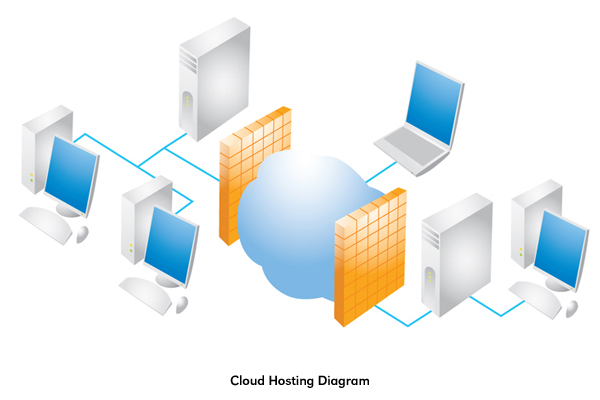Cloud Hosting Defined
Cloud Hosting, also called clustering is a hosting service that operates a network of servers that are connected permanently. As a shared hosting is limited to the resources like disk space, bandwidth, memory, processing speed of a single machine, the cloud servers provide access to a virtually infinite infrastructure and do not necessarily need to be in the same data center, in reality it is likely that the servers are spread around the world.
The Cloud Hosting provides an environment that does not limit the request to a specific set of resources.
The Cloud Hosting allows servers hosting sites to have an agility and optimized performance. The servers use redundant networks and large Internet service providers with local and international broadband connection.
How it works
Features of Cloud Hosting is limited to hardware and application handlers. For example, resources may be limited to the amount of: RAM server, processing, energy storage and bandwidth. It can also be limited to the amount of available space, budget and a host of other reasons that hinder the expansion.
Cloud computing allows the customer to buy more computing power according to the need. Energy resources and load balancing are intended to provide seamless connectivity to the end user .
With the opportunity to have more resources available, the end user is able to expand business without incurring extra inventory or overhead. For the first time, he’s getting something that is economically efficient, more reliable and better all around.
Companies of Cloud Hosting only charge the amount of computing power that is used by the user. Think of it as a bill similar to the supply of electricity or water – you pay for what you use. The Cloud Hosting provides the ability to meet sudden spikes in traffic without having to pay for extra bandwidth when traffic is slow. All billing is based on use.
The Cloud Hosting offers benefits of reduced costs through consolidation, more security , better performance and flexibility. There is also the benefit of redundancy. Users are now able to reduce its inventory of hardware, which leads to less energy requirements and, of course, benefits the environment.
The Cloud Hosting is a very attractive proposition for anyone involved in commerce of any kind and especially those with budget constraints. Small businesses and entrepreneurs, among others, are able to focus on growing the company without having to learn new skills or spend precious budget resources with additional personnel.
The Cloud Hosting is great for IT professionals who can pre-establish their bandwidth based on different levels of Internet traffic.
The days are gone when it was necessary to maintain contact with the host to request extra bandwidth or lose the habit, because the band was not available.
Ease of Use
What was once done by a large number of IT professionals, can now be accomplished by one person in a matter of minutes. Suppose, for example, we need a server to host our applications. It will now be able to launch a server with its own root password where the user can load its own code.
In many cases, there is no provision of a domain, blog WordPress and other applications.
In conclusion, the Cloud Hosting is stronger, more profitable and more reliable than the issue of self-hosting.
- How Cloud Computing Is Changing The Labor Market - March 25, 2015
- Adopting Infrastructure as a Service Can be a Good Deal - March 17, 2015
- Will Virtualize? Take These Six Points Into Consideration - March 12, 2015

good 🙂